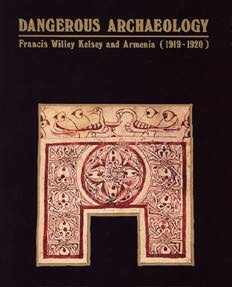
Kelsey's expedition took place at a pivotal moment in the history of archaeology. He must be counted among the first-generation scientist-archaeologists who still clung to the roles of adventurer-explorer and statesman. They attempted both to understand and to participate in the writing of Western history. Kelsey and his contemporaries, like the Orientalist Breasted, wrote histories filtered through notions of their own cultural origins. They traced the glory of the West, endowing it with the most desired origins, whether found in the art of Dura Europos or Constantinople.
The development of the discipline of archaeology continues. In archaeology, as in art history and other fields of history, there is a new, mounting awareness of the enduring ramifications of the forces at work in the formation of scholars like Kelsey and Breasted. Research into the growth of these fields is bringing forth information about the biases inherent in our histories as well as critical methodologies for further study of diverse cultures and points of view other than our own. A pure science of archaeology escapes us in so far as our present situations continue to condition our understanding of the past. Kelsey, Breasted and others of the first generation of scientific archaeology were bound by their own points of view, as were their predecessors, and as are their successors.
Consider the following comments by scholars from the 19th century until the present as examples of the ways in which archaeologists and other historians have long been cognizant of the self-serving uses of history:
"To everyone who looks back on his past life," wrote the English antiquarian Benjamin Thorpe in 1851, "it presents itself rather through the beautifying glass of fancy, than the faithful mirror of memory; and this is more particularly the case the further this retrospection penetrates into the past. . . . "Among nations," Thorpe continued, "the same feeling prevails. They also draw a picture of their infancy in glittering colors. [italics added]. . . Man's ambition is two-fold: he will not only live in the minds of posterity; he will have also lived in ages gone by. He looks not only forward but backwards also; and no people on earth is indifferent to the fancied honor of being able to trace its origins to the gods, and of being ruled by an ancient race."
(quoted in Neil Asher Silberman's Between Past and Present. Archaeology, Ideology, and Nationalism in the Modern Middle East, New York, 1989, p. 1)
* * * * *
As [Darwin and] the natural scientists have labored on, the physical origin of man from lower animals has become far clearer. But between the historians and the natural scientists there has been a "great gulf set," with the result that we now have on the one hand the paleontologist with his picture of the dawn-man enveloped in clouds of archaic savagery, and on the other hand the historian with his reconstruction of the career of civilized man in Europe. Between these two stand we orientalists endeavoring to bridge the gap. It is in the gap that man's primitive advance passed from merely physical evolution to an evolution of his soul, a social and spiritual development which transcends the merely biological and divests evolution of its terrors. It is the recovery of these lost stages, the bridging of this chasm between the merely physical man and the ethical, intellectual man, which is a fundamental need of man's soul as he faces nature today. We can build this bridge only as we study the emergence and early history of the first great civilized societies of the ancient Near East, for there still lies the evidence out of which we may recover the story of the origins and the early advance of civilization, out of which European culture and eventually our own civilization came forth. [italics added]
(James Henry Breasted, "The Task of the Orientalist and Its Place in Science and History" in The Oriental Institute, Chicago, University of Chicago Press, 1933)
* * * * *
Archaeologists are invited to consider critical theory by evidence that archaeology in some environments is used to serve political ends and by the growing controversy over the ownership and control of remains and interpretations of the past. The claim of a critical archaeology is that seeing the interrelationship between archaeology and politics will allow archaeologists to achieve less contingent knowledge. [italics added]
(Mark P. Leone, Parker B. Potter, Jr., and Paul A. Shackel, "Toward a Critical archaeology" in Current Anthropology 28/3 (June 1987): 283-302)
